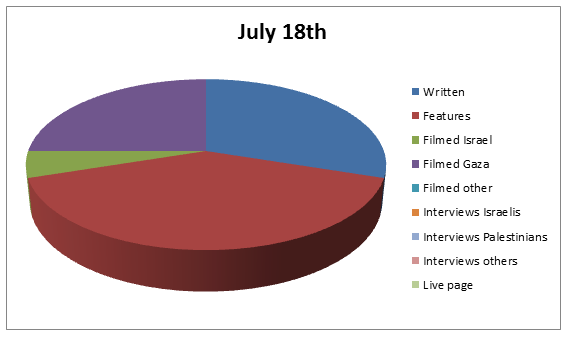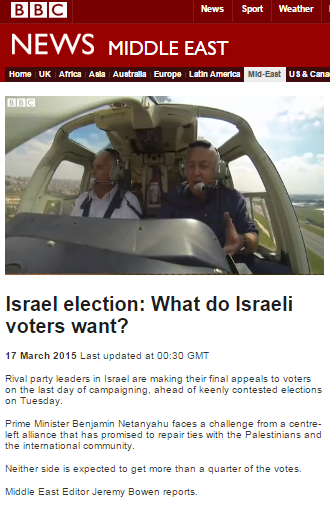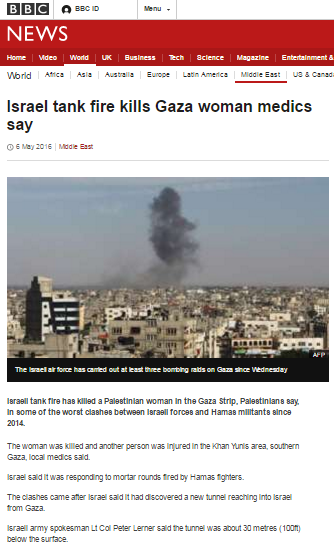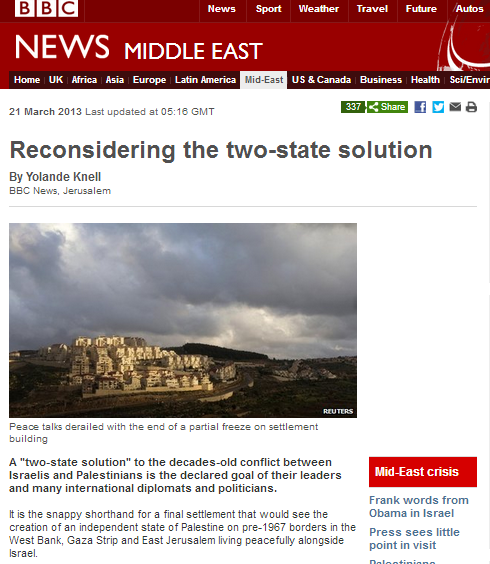In part one of this post we documented BBC News website coverage of the first ten days of Operation Protective Edge. Part two relates to the next ten days: July 18th to 27th 2014 inclusive.
Content on the website included written news reports and written ‘Features and Analysis’ articles as well as filmed items presented as stand-alone reports and additionally often embedded into the written articles. Those filmed items also appeared on BBC television news programmes and hence give us an idea of what worldwide audiences were being shown and to what extent the BBC lived up to its claims of “equal coverage” of the two sides to the conflict.
A small amount of content which appeared on the BBC News website at the time has since become unavailable, but below are the vast majority of the reports offered to the website’s visitors. We are not including here the many reports concerning demonstrations relating to the conflict in Europe and elsewhere which appeared on the Middle East page: that topic will be covered separately.
Written:
Israel starts Gaza ground offensive
Israel ready to widen Gaza ground offensive – PM (discussed here)
Gaza conflict: UN says number of displaced almost doubles (discussed here)
Features:
Gaza-Israel: ‘We don’t want civilians to die’
What drove Hamas to take on Israel? Dr Jeroen Gunning
Gaza: What does Israel’s ground offensive aim to achieve? Jonathan Marcus
Hospital on Gaza conflict’s front line Paul Adams (discussed here)
Filmed:
Gaza-Israel conflict: Journalists evacuated from Gaza hotel Lyse Doucet in Gaza
Gaza City resident: ‘Continuous bombing’ Gaza
Gaza conflict: UN says number of displaced almost doubles Lyse Doucet in Gaza & Quentin Sommerville in Israel (discussed here)
With Israel’s ground operation having commenced late the previous night following the terrorist infiltration via cross-border tunnel near Kibbutz Sufa (scantily covered by the BBC), much of the BBC’s coverage on that day related to that topic, but with a notable lack of information on the subject of the tunnels themselves.
Written:
Gaza conflict: Obama warns Israel amid rising death toll (discussed here)
Gaza conflict: Casualties mount amid fresh violence (discussed here)
July 20th: (discussion here)
Live page:
As it happened: Gaza conflict intensifies
Written:
Gaza shelling by Israel leads to deadliest day of conflict (discussed here)
Features:
In pictures: Gaza conflict intensifies
Filmed:
Hamas ‘defiant’ as Gaza casualty toll rises Lyse Doucet in Gaza (discussed here)
Gaza crisis: 87 Gazans and 13 Israeli soldiers killed Lyse Doucet in Gaza
Gaza shelling by Israel leads to deadliest day of conflict Yolande Knell in Gaza
Gaza crisis: 13 Israeli soldiers and 87 Gazans killed Chris Morris in Israel (discussed here)
Gaza-Israel conflict: ‘Families are on the run again’ Lyse Doucet in Gaza
With fierce fighting having commenced in the neighbourhood of Shuja’iya the night before, the BBC focused its attentions on that topic on July 20th. Themes which appeared early on in the extensive reporting included the vigorous promotion of second-hand claims of a ‘massacre’, the failure to film or adequately inform audiences of the presence and actions of terrorists in that district and the failure to distinguish between civilian and combatant casualties. As was the case in previous reporting, the topic of Hamas’ use of human shields was ignored and the prior warnings issued to residents of Shuja’iya to evacuate the neighbourhood played down.
July 21st: (discussion here)
Written:
Gaza crisis: 13 Israeli soldiers, scores of Gazans killed
Gaza crisis: UN calls for ceasefire as deaths pass 500
Features:
Gaza crisis: Shejaiya assault defines grimmest day Lyse Doucet
Filmed:
Ron Prosor: ‘Only by demilitarising Hamas can we move on’ interview Israeli Ambassador to the UN
Gaza crisis: Israeli soldiers’ funerals take place John Simpson in Israel
Middle East crisis: BBC on deserted streets of Sha’af Paul Adams in Gaza
Gaza conflict: Five dead at hospital hit by Israeli strike Lyse Doucet in Gaza
Middle East crisis: Israel releases ‘Gaza tunnel footage’ (discussed here)
Clashes go on as Israel holds funerals for the dead John Simpson in Israel (discussed here)
Gaza crisis: Kerry Israel air strike remarks caught on mic
‘Israel united’ on Gaza offensive to eliminate militants’ tunnels Quentin Sommerville in Israel
Coverage of the fighting in Shuja’iya continued in the same vein as the previous day and with continued promotion of unverified Hamas-supplied casualty figures which failed to distinguish between civilians and combatants. It is worth noting that to date, BBC audiences have not yet been provided with a comprehensive picture of the circumstances of the fighting in Shuja’iya. Three days after the commencement of the ground operation, the BBC produced a very unsatisfactory filmed ‘guide’ to the topic of cross-border tunnels.
Written:
Gaza conflict: Five dead at hospital hit by Israeli strike
Gaza conflict: Diplomats push for ceasefire
Gaza conflict: UN chief Ban urges end to fighting
US and European airlines suspend Israel flights
Features:
Gaza: How Hamas tunnel network grew Dr Eado Hecht
Filmed:
Gaza-Israel: John Kerry and Sameh Shoukry hold news briefing
Gaza: Why is Rafah crossing so important? Lyse Doucet in Gaza (discussed here)
Airlines halt flights into Israel Samira Hussain in New York
Gaza-Israel: Casualties mount as violence continues Paul Adams in Gaza
Relatives mourn Israeli soldier deaths as clashes go on Quentin Sommerville in Israel
Why is Middle East truce so hard to broker? Frank Gardner (discussed here)
John Kerry in Egypt in push for Gaza-Israel ceasefire
$47m in aid to Gaza “to alleviate the immediate humanitarian crisis” Kerry
Notable on this day was the appearance of the first real effort to inform audiences with regard to cross-border tunnels; some four days after the ground operation their use prompted began. Also notable was the continued amplification of Hamas’ pre-ceasefire demands concerning the lifting of border restrictions and the misrepresentation of those restrictions, along with their inaccurate description as a “siege”: a theme which flourished in subsequent BBC coverage.
Written:
Gaza conflict: Abbas backs Hamas ceasefire demands (discussed here)
UN’s Navi Pillay warns of Israel Gaza ‘war crimes’
Features:
Why Israelis are rallying behind latest Gaza campaign Gil Hoffman
What is it like to be blind in Gaza and Israel? Emma Tracey
Filmed:
Middle East crisis: Normal life on hold in Gaza Yolande Knell in Gaza (discussed here)
Red Cross van attacked by civilians in Gaza Paul Adams in Gaza
UN human rights boss: Israeli action ‘could be war crimes’ Navi Pillay
Middle East crisis: Israel holds funerals for soldiers Quentin Sommerville in Israel
Middle East crisis: Airlines suspend flights to Ben Gurion, Israel
#BBCtrending: Jews and Arabs refuse to be enemies
Along with renewed promotion of the notion of ‘war crimes’, reporting on this day continued with promotion of Hamas’ pre-ceasefire demands, misrepresentation of the border restrictions imposed by Egypt and Israel and continued amplification of unverified casualty figures.
Written:
Hamas says Gaza blockade must end before ceasefire (discussed here)
UN: Gaza humanitarian situation ‘dire’
Gaza UN school shelter hit, ‘killing 13’
Europe lifts ban on flights to Tel Aviv airport
Features:
Gaza: Hamas seeks to emerge stronger Yolande Knell (discussed here)
Filmed:
Gaza conflict: Rescue mission to reach Gaza wounded Lyse Doucet in Gaza
Save the Children: Gaza shelter attack ‘shocking’
Gaza’s hospitals struggle with civilians Ian Pannell in Gaza
Middle East crisis: Gaza UN school shelter hit, ‘killing 13’ Yolande Knell in Gaza
Middle East crisis: Gaza family on living in warzone Yolande Knell in Gaza
Israel ‘knew building was UN shelter’ – UNRWA Chris Gunness
Middle East crisis: UN criticism ‘a travesty’ – Netanyahu
Gaza: What are the obstacles to peace? James Robbins (discussed here)
BBC exclusive interview with Hamas leader Khaled Meshaal (discussed here)
Much of the day’s coverage was devoted to the incident in Beit Hanoun which the BBC immediately promoted as an Israeli ‘attack’ on a UN school, revealing much about its own impartiality. Also notable was James Robbins’ ‘backgrounder’ which provided one example among many of BBC content which downplayed or erased Hamas’ terror designation.
Written:
Palestinians killed in West Bank Gaza solidarity march (discussed here)
Gaza conflict: Israel rejects truce ‘as it stands’
Features:
Israeli and Palestinian women on Gaza conflict
#BBCtrending: Sexy selfies in support of IDF
Filmed:
Gaza-Israel crisis: UNRWA ‘not informed’ before shelter attack Chris Morris in Gaza
Middle East crisis: Israeli government on Gaza shelter deaths Mark Regev (full interview discussed here)
Gaza-Israel: ‘You can hear the bombs and missiles’ – Israeli family Bethany Bell in Israel
Palestinians killed in West Bank Gaza solidarity march Nawal Assad in Qalandiya (discussed here)
Gaza baby rescued from mother killed by Israeli airstrike Ian Pannell in Gaza
Ban Ki-moon and John Kerry news briefing in Cairo
Gaza and Israel brace for ‘day of anger’ Jon Donnison in Jerusalem
Coverage of the Beit Hanoun incident continued, along with problematic reporting on riots in PA-controlled areas.
Written:
Gaza conflict: 12-hour truce as deaths top 900
Hamas fires rockets into Israel after Gaza truce bid
Features:
Gaza crisis: Toll of operations in Gaza (later amended and date changed to September 1st)
Filmed:
Clashes as diplomatic efforts continue to secure Gaza truce Orla Guerin in Jerusalem (discussed here)
Mark Regev: Israel ‘wants peace and quiet’
Gaza truce: ‘Smell of destruction’ in the air Chris Morris in Gaza
Israel and Hamas agree 12-hour truce Chris Morris in Gaza
Israel-Gaza conflict: Bodies recovered amid ceasefire Ian Pannell in Gaza
Philip Hammond on ceasefire: ‘Stop the loss of life’ UK Foreign Secretary
Written:
Israel rejects Gaza school shelter attack blame
Israel resumes Gaza offensive after Hamas rockets
Hamas announces new 24-hour Gaza ceasefire with Israel
Hamas-declared ceasefire in Gaza stalls as conflict continues (discussed here)
Features:
No place to hide for children of war in Gaza and Syria Lyse Doucet
Filmed:
Gaza conflict: Dubai’s huge humanitarian aid mission Mark Lobel
Israeli military: Hamas ceasefire ‘an opportunity perhaps’ Peter Lerner
Hamas announces new 24-hour Gaza ceasefire with Israel Osama Hamdan
Hamas-declared ceasefire in Gaza stalls as conflict continues Ian Pannell in Gaza (discussed here)
Rockets lands in Israel after ceasefire stalls Orla Guerin in Israel (discussed here)
Middle East: Ed Miliband on Israel and Gaza violence
Prominent on this day was misleading coverage of the ceasefire and Hamas’ violations of that agreement.
Between July 18th and July 27th the predominant type of content presented to visitors to the BBC News website’s Middle East page was written news reports and a live page on the topic of the fighting in Shuja’iya was introduced for the first time on July 20th.
Foreign-based Hamas spokesmen were interviewed on just two occasions (in contrast with five interviews or footage from press conferences with Israelis) meaning that the focus of BBC reporting remained on the civilian population of the Gaza Strip. The majority of footage of interviews or press conferences with others (not Israelis or Palestinians) focused on the diplomatic efforts of the US Secretary of State, with two additional ones from UN representatives Navi Pillay and Chris Gunness and two with British politicians.
The total number of filmed reports describing the situation in Gaza during those ten days of the conflict was once again more than double the number of filmed reports describing the situation in Israel and continued to focus on emotive coverage of the effects of the conflict on the civilian population. Three additional filmed reports related to the topic of violent rioting in PA-controlled areas and Jerusalem.
By July 27th, visitors to the BBC News website had seen twenty-four filmed reports depicting the situation in Israel compared to fifty-three filmed reports depicting the situation in the Gaza Strip.
Themes which dominated initial BBC coverage of the conflict such as the promotion of the notion of ‘war crimes’ and attacks on civilians carried out by Israel continued, as did the failure to report adequately on Hamas’ use of human shields and the amplification of unverified casualty figures. The theme of border restrictions became more prominent, together with misrepresentation of the reasons for those restrictions and promotion of the inaccurate notion of a ‘siege’ on Gaza.
Related Articles:
BBC News website coverage of Operation Protective Edge: part one














